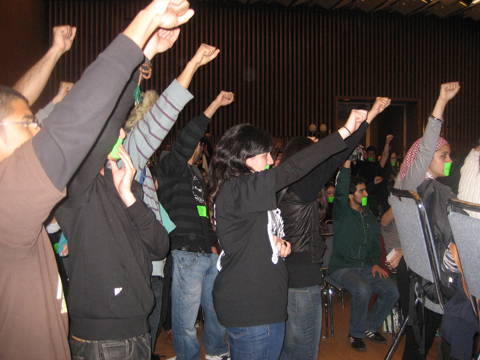
SHOULD SPEAKING BE SILENCED? Looking at the nature of debate. |
The opening segment of Between Two Worlds deals with the bitter disagreement over the San Francisco Jewish Film Festival's 2009 decision to screen the controversial documentary Rachel, about an American activist crushed by an Israeli Defense Forces bulldozer near the Egyptian border in 2003. The film uses this controversy as a springboard to examine questions of American Jewish politics, identity, and attitudes toward Israel, beginning with the filmmakers' own families, each a study in the uneasy tension between assimilation and (in the film's own words) tribal identity. Co-directors Alan Snitow and Deborah Kaufman move from these intimate stories to a quick look at the Birthright program, which encourages young American Jews to spend time in Israel and to be fruitful and multiply with other Jews.
Having set the stage for a broader look at Jewish identity and its intersection with American liberal ideals, Between Two Worlds then takes up two fraught questions: whether university endowments should divest themselves of Israeli assets, and whether a Museum of Tolerance and Human Dignity should be built on an ancient Muslim cemetery in Jerusalem. Throughout, the film rigorously offers substantial screen time to the two poles of American Jewish arguments about Israeli policy. In phrases loosely borrowed from the film itself, these positions are (on the right) "Israel — right or wrong" and (on the left) "Jews have a duty to make sure Israel upholds Jewish moral values."
Between Two Worlds does a fine job of allowing everyone to be heard, but despite this painstaking effort at evenhandedness, the politics of the film are clear. Snitow and Kaufman have created a film about the danger of declaring that some questions cannot be asked, and that declaration is firmly imputed to the political right. Fundamentally, the film is an examination of the dangers of demonizing criticism by reflexively claiming that all dissent (to borrow one of Natan Sharansky's Three D's, quoted early in the film) demonizes Israel. It hardly seems controversial to suggest that maybe the IDF shouldn't run college students over with bulldozers; but of course when the question is something Israel did, it's never that simple.
The hecklers shouting down a San Francisco speaker who blames Corrie for the situation that led to her death don't come off well in the film, but neither does the smug dean of the Wiesenthal Center, Rabbi Marvin Hier, dismissing concerns about the treatment of Muslim remains. The voices given the most screen time argue that a new and necessary synthesis of Jewish and American identity is irreversibly under way, a new paradigm of Jewish identity that is more in touch with Jewish tradition than the Jewish right's attempt to preserve a constructed and ahistorical notion of what Jews are and what Israel is.
When the film takes sides, it is for those who question and against those who would suppress questions. The liberal voices in the film ask questions and the conservative voices raise the specters of the Holocaust, Hamas, and Ahmadinejad by way of characterizing dissent as disloyal or anti-Semitic . . . but again, it's not that simple. One wonders if Snitow and Kaufman might have found more voices on the right who were willing to engage the kinds of questions they want to ask. What would Charles Krauthammer or Bill Kristol or David Brooks have to say?